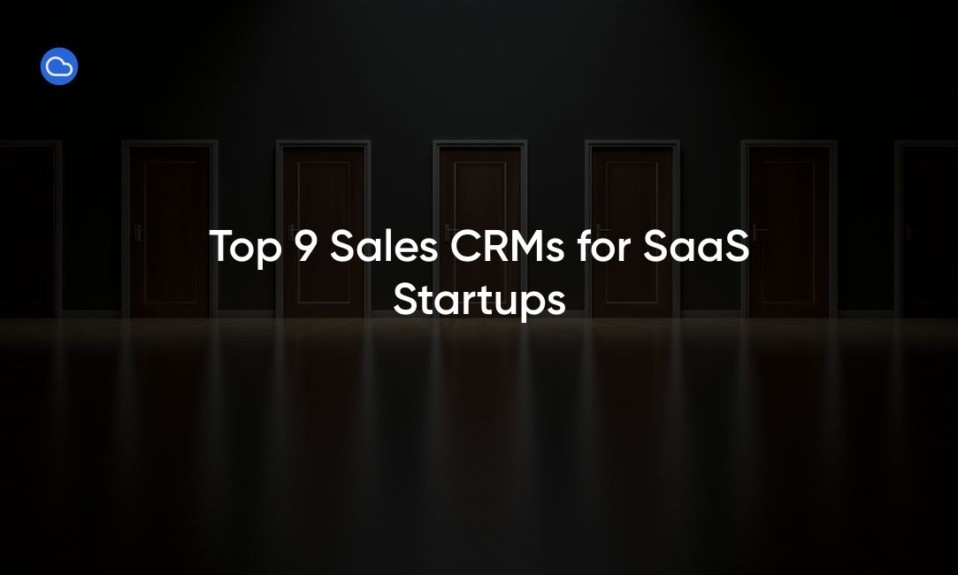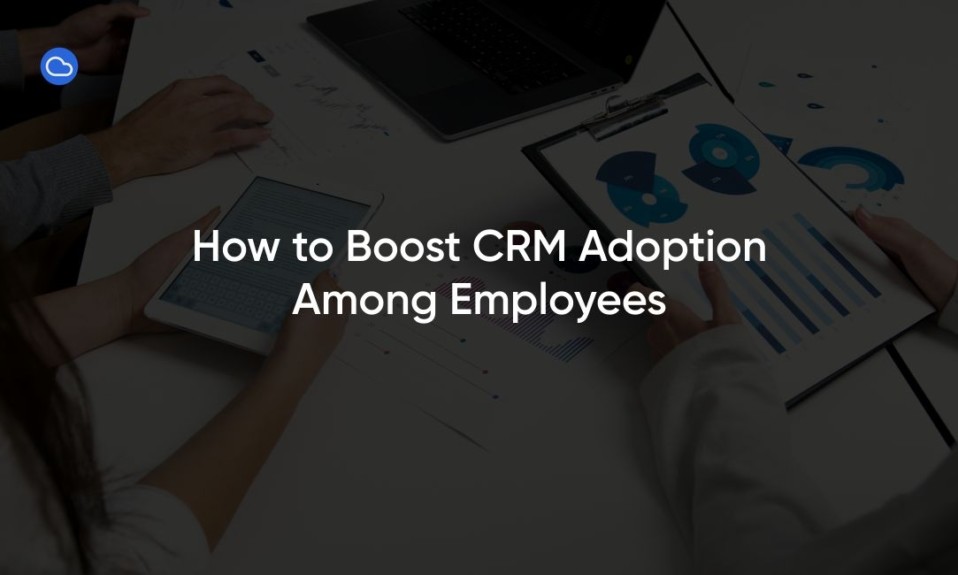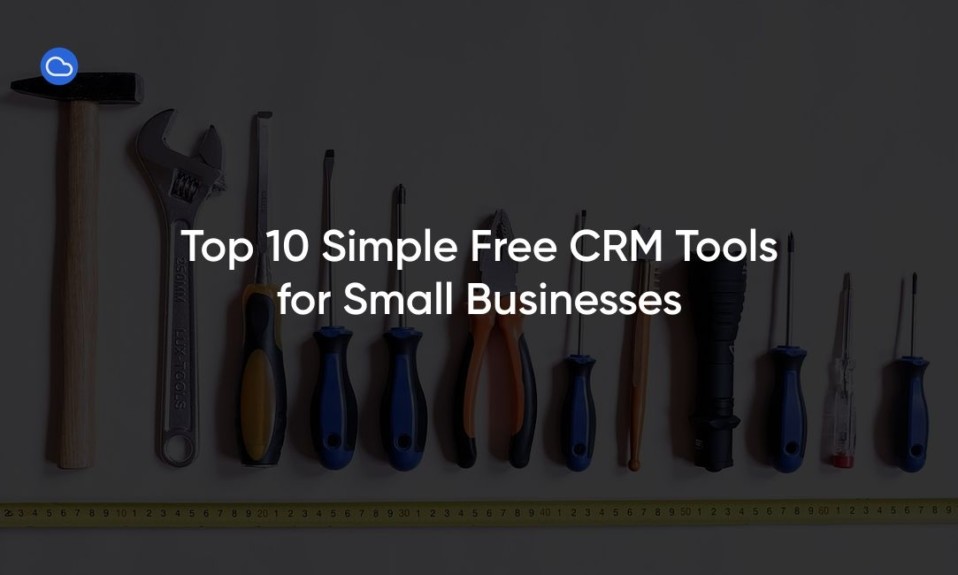Finding a CRM that fits both your startup’s budget and growth ambitions can feel impossible.
Many solutions quickly become expensive as you add users or features, stretching limited resources thin.
That’s where specialized CRM for startups shines—affordable tools designed to scale with you.
You’ll discover ten robust platforms under $50/month that handle everything from lead tracking to sales pipelines.
We break down pricing, key features, and real startup use cases to help you pick the perfect fit.
What is CRM for startups
CRM, or Customer Relationship Management, refers to software solutions designed specifically for startups. These tools help early-stage companies manage customer data, organize leads, and streamline sales processes.
Your focus on nurturing relationships with customers becomes easier with the right CRM system in place. From my experience, utilizing a startup CRM can transform how you approach customer interactions.
Picture having all your customer interactions, preferences, and histories in one centralized location. It helps you see patterns and trends, leading to more personalized engagement. Organizing leads and tracking your sales pipeline become straightforward, allowing your team to work more efficiently.
CRM systems optimize communication and collaboration across your team. Information becomes readily accessible, facilitating a seamless flow between sales, marketing, and customer service.
This centralization empowers you to focus on what truly matters—building long-lasting customer relationships. I believe that startups using CRM not only improve their operational efficiency but also enhance customer satisfaction.
Why do startups need a CRM
Improved customer relationship management
CRM systems play a pivotal role in helping startups cultivate strong customer relationships. Centralized contact information serves as a foundation, ensuring you have all the details at your fingertips.
This feature enables efficient tracking of interaction history, allowing you to understand customer preferences and behaviors deeply. I’ve experienced the impact of personalized communication tracking firsthand—it transforms the way you engage with customers.
Instead of generic messages, you can craft tailored communications that resonate with your audience. This personal touch fosters loyalty and builds lasting connections.
Effective relationship management involves knowing your customers. CRM tools simplify this process, allowing you to access valuable insights that drive meaningful conversations.
Enhanced sales pipeline visibility
Visual sales pipeline management brings clarity and control to the sales process. Startups can track deals easily, allowing for quick adjustments when necessary.
This proactive approach enables identification of any bottlenecks that may arise. I genuinely believe that having a clear view of your sales pipeline can change the game for startups.
Deal tracking becomes more efficient with an organized system. You stay informed about the status of each deal, which helps prioritize tasks effectively.
This visibility allows you to dedicate resources where they matter most. Those small changes can lead to significant improvements in closing rates.
Forecasting capabilities add another layer of confidence. Predicting future sales trends becomes simpler, aiding in financial planning and goal-setting.
Streamlined team collaboration
CRM platforms significantly enhance communication among your sales, marketing, and customer service teams. These systems allow for shared data access, ensuring everyone stays on the same page.
Well, if your team uses a CRM, it simplifies workflows and boosts cooperation. Automated workflows play a key role—imagine tracking customer interactions and important metrics without the hassle of manual entry.
This efficiency fosters deeper collaboration, allowing each team member to focus on what they do best. I’ve watched teams thrive when they can easily share insights and updates.
When all departments harness the same tools, the outcome strengthens customer relationships. You create a seamless experience that customers appreciate.
Data-driven decision making
CRM analytics and reporting features play a vital role in guiding startups toward informed business decisions. They provide insights into customer behavior and sales performance, which can significantly impact your strategic choices.
I’ve seen how powerful these tools can be in uncovering trends and patterns that otherwise might go unnoticed. When you leverage CRM analytics, you gain a deeper understanding of your customers.
This understanding empowers you to tailor your offerings to meet their needs effectively. Sales performance data allows you to identify which strategies work best and which ones require adjustment.
By utilizing the right analytics features, you enhance your ability to predict market shifts and respond thoughtfully. Exploring metrics like customer retention and sales cycle duration can guide your next steps.
Top 10 affordable CRM solutions under $50 per month
HubSpot CRM
HubSpot CRM offers a robust platform designed to support startups in managing customer relationships effectively. The free plan includes essential features like contact management, live chat, and email marketing tools, making it accessible for businesses just getting off the ground.
As your startup grows, paid plans begin at $50/month, providing additional functionality and scalability. Plus, HubSpot offers startup discounts through the HubSpot for Startups program, which I think is a fantastic resource for emerging companies.
The user-friendly interface means you spend less time learning and more time engaging with your customers. (Let’s be honest—that’s what matters most!)
| Feature | Free Plan | Paid Plans |
|---|---|---|
| Contact Management | ✓ | ✓ |
| Email Marketing | Basic | Advanced |
| Live Chat | ✓ | ✓ |
| Marketing Automation | ✗ | ✓ |
Pros:
- User-friendly interface that’s perfect for beginners
- Comprehensive free plan with essential features
- Startup discounts available through special programs
Cons:
- Limited features on the free plan for growing teams
- Paid plans can become costly as additional needs arise
Best for: Startups seeking an affordable yet effective CRM solution with room to grow.
Pricing: Free plan available; paid plans start at $50/month with potential startup discounts.
Zoho CRM
Zoho CRM offers a highly customizable solution that starts at just $14 per user per month. This platform excels in workflow automation, facilitating multi-channel communications and providing an AI assistant to streamline processes.
It’s especially well-suited for startups, allowing you to scale your operations seamlessly as your business grows. The customization options are pretty impressive—you can tailor the interface to match your specific workflow needs.
Pros:
- Highly customizable interface tailored to your needs
- Multi-channel communication options for better engagement
- AI assistant for automated tasks and insights
Cons:
- Learning curve with the extensive features available
- Higher costs can accumulate with added functionalities
Best for: Cost-conscious startups needing a scalable, customizable CRM solution.
Pricing: Starts at $14/user/month, making it one of the most budget-friendly options available.
Freshworks CRM
Freshworks CRM delivers AI-driven lead scoring and streamlined workflow automation, making it a top choice for startups new to CRM systems. Its user-friendly setup allows you to dive into managing customer relationships without a steep learning curve.
I’ve found this to be especially beneficial for early-stage companies aiming for rapid growth. The AI-based lead scoring feature helps prioritize prospects automatically—pretty neat, right?
Pros:
- Intuitive setup tailored for beginners
- AI-based features for better lead scoring and insights
- Easy integration with popular business tools
Cons:
- Advanced features may require higher-tier plans
- Limited customization options compared to competitors
Best for: Startups new to CRM systems who want AI-powered features without complexity.
Pricing: Various plans starting from $15 per user/month, making it budget-friendly for growing teams.
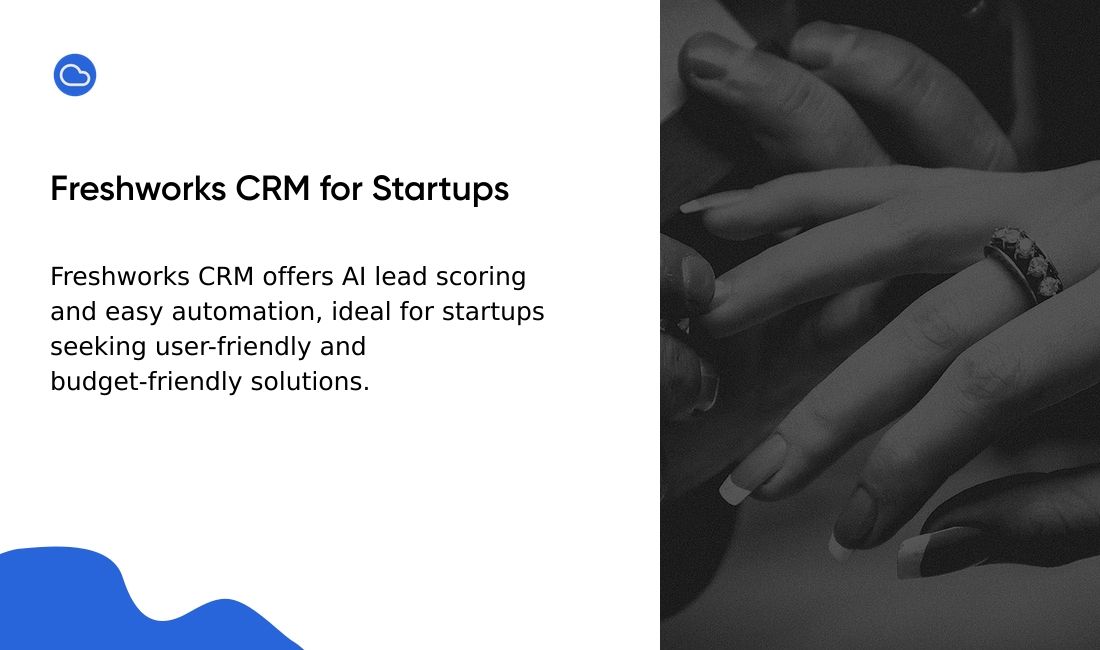
Pipedrive
Pipedrive is a visual sales pipeline management tool designed specifically for sales-focused startups. This platform features a user-friendly drag-and-drop interface, making it simple to organize leads and track sales activities efficiently.
With functionalities like activity reminders and seamless email integration, Pipedrive enhances your productivity and streamlines your sales process. I have noticed that it truly helps startups gain clarity in their sales workflows and maintain focus on what matters most—the customer.
If you’re looking for a CRM that aligns perfectly with your sales strategy, Pipedrive is certainly worth considering.
Pros:
- Intuitive drag-and-drop interface for easy pipeline management
- Activity reminders keep your team organized and on track
- Strong email integration capabilities
Cons:
- Limited functionality in lower pricing tiers
- May lack some marketing automation features
Best for: Sales-focused startups that prioritize visual pipeline management and activity tracking.
Pricing: Various plans starting around $15 per user per month.
Copper
Copper serves as a Google Workspace native CRM tailored for startups. Its seamless integration with Gmail, strong contact management capabilities, and sales automation features perfectly fit startups that prioritize a Google-centric workflow.
I’ve discovered that using Copper has simplified many tasks, allowing teams to interact with clients without switching between various tools. Everything flows smoothly from your email, which saves a lot of time and hassle.
Are you already using Google Workspace for everything? Then Copper might be your perfect match.
Pros:
- Seamless integration with Google Workspace ecosystem
- Intuitive user interface for easy navigation
- Robust automation features for tasks and workflows
Cons:
- Limited to users within the Google ecosystem
- Pricing may be higher than some competitors
Best for: Startups already committed to Google Workspace looking for integrated solutions.
Pricing: Plans start at approximately $25 per user per month.
Insightly
Insightly serves as a project management integrated CRM, merging customer relationship management with effective task tracking. This approach makes it particularly suitable for service-based startups that need to manage client projects with precision.
The platform’s user-friendly design allows you to organize leads, manage customer data, and streamline workflows, which is incredibly beneficial during those early stages when every detail matters. I’ve explored the functionalities of Insightly and truly appreciate how it simplifies complex tasks.
Pros:
- Integrated project management features for comprehensive oversight
- User-friendly interface suitable for non-technical users
- Strong task tracking and workflow management
Cons:
- Limited customization options compared to other CRMs
- Pricing may rise with additional features and user accounts
Best for: Service-based startups requiring robust project management alongside CRM functionalities.
Pricing: Various pricing tiers starting at $29 per user per month.
Agile CRM
Agile CRM offers an all-in-one solution tailored for startups. It combines marketing automation, sales tracking, and comprehensive customer service features. This platform is designed to empower new businesses with budget-friendly pricing without compromising functionality.
I personally appreciate Agile CRM for its user-friendly interface and the way it simplifies processes. For startups looking to manage customer interactions effectively, this software stands out as a viable choice.
Pros:
- Affordable pricing suitable for tight startup budgets
- Integrates marketing automation and sales tracking seamlessly
- Comprehensive customer service features included
Cons:
- Limited advanced features compared to larger platforms
- Customization options can be somewhat basic
Best for: Startups seeking a comprehensive, budget-friendly solution for customer relationship management.
Pricing: Free plan available for basic functionalities; premium plans under $50/month.
Capsule CRM
Capsule CRM offers a simple contact management and sales tracking system that stands out with its clean interface and essential CRM features. This platform is designed with small startups in mind, catering specifically to those with basic requirements.
I’ve found Capsule CRM to be user-friendly, making it easy to organize contacts and manage customer interactions. The straightforward design allows for quick access to information without feeling overwhelmed.
Actually, it supports growth as your needs evolve, making it a solid choice for startups just finding their footing in customer relationship management.
Pros:
- Intuitive user interface that’s easy to navigate
- Essential features perfect for basic CRM needs
- Clean, uncluttered design
Cons:
- Limited advanced features for larger teams
- Pricing scales with additional users and features
Best for: Small startups and entrepreneurs seeking a straightforward, no-frills CRM solution.
Pricing: Free plan available; paid plans begin at $12 per user per month.
Nutshell CRM
Nutshell CRM provides user-friendly features perfect for growing businesses and small teams. This software combines built-in reporting, email marketing, and sales automation. With a focus on simplicity, it empowers startups to manage their customer relationships effectively without overwhelming complexity.
It’s designed for startups looking for an intuitive interface that streamlines lead management and enhances productivity. Personally, I find its integrated email marketing tools to be especially helpful in reaching out to potential clients.
The dashboard is quite straightforward to navigate, which makes it easy to monitor your sales process. (No more hunting through confusing menus!)
Pros:
- User-friendly interface that enhances team efficiency
- Built-in email marketing tools to engage clients effortlessly
- Comprehensive reporting features for insights
Cons:
- Limited customization options compared to more robust CRMs
- May lack some advanced features that larger businesses require
Best for: Small to medium-sized startups needing straightforward solutions for customer relationship management.
Pricing: Plans start under $50 per month, making it an affordable option for growing teams.
Streak CRM
Streak CRM integrates seamlessly with Gmail, transforming your inbox into a comprehensive customer management system. This tool is designed specifically for startups that rely heavily on email communication.
It allows you to manage leads, track interactions, and coordinate your sales processes all from one platform. Based on my experience, this integration simplifies daily operations and enhances productivity significantly.
Given its focus on email, I truly think many startups can benefit from using Streak in their customer relationship strategies. Plus, if you’re already living in Gmail, why not make it work harder for you?
Pros:
- Seamless integration with Gmail for email-centric workflows
- Customizable pipelines for effective lead management
- No need to learn a separate interface
Cons:
- Limited features in the free version
- May be complex for users not familiar with Gmail
Best for: Email-heavy startups that utilize Gmail for most communication needs.
Pricing: Free plan available for basic features; paid plans offer advanced functionalities.
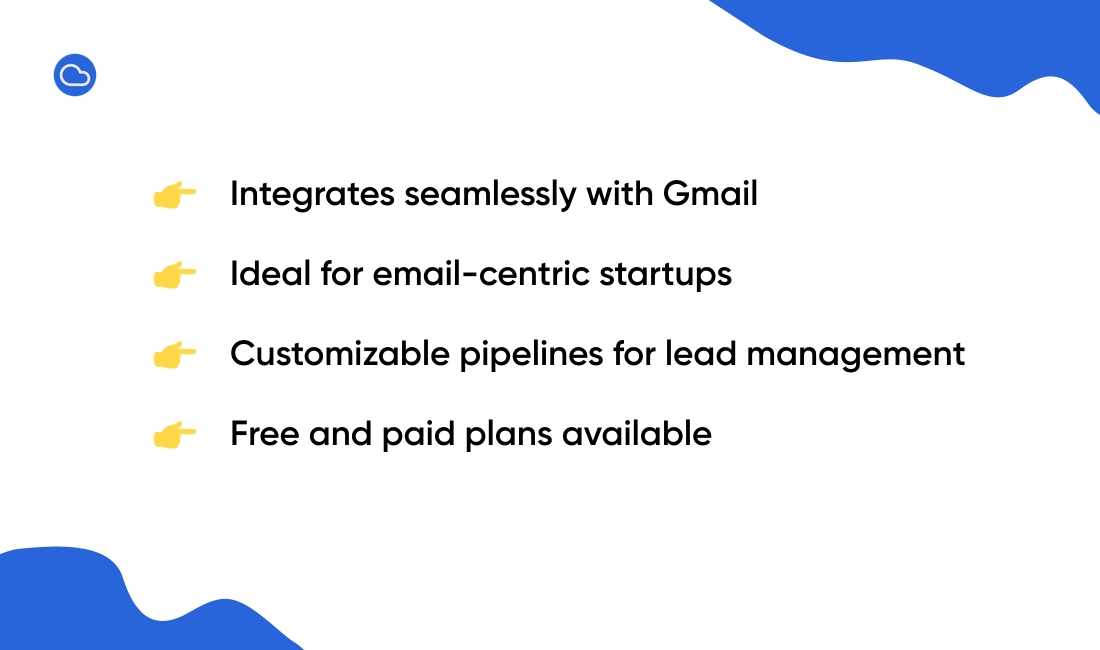
How do startups choose a CRM
Choosing the right CRM for startups involves several important factors. I believe evaluating your budget constraints is one of the first steps.
Determine how much you can afford to spend monthly. Many CRMs offer tiered pricing, so know your limits and explore options that fit within your range.
Feature requirements come next. What essential features do you need to manage customer interactions effectively? Look for tools that streamline sales processes, provide lead management, and enhance customer data organization.
Here’s what to prioritize when evaluating CRM options:
- Budget alignment – Ensure monthly costs fit your financial constraints
- Essential features – Focus on must-have functionalities for your industry
- Scalability potential – Choose systems that grow with your business
- Implementation ease – Consider onboarding complexity and training requirements
- Integration capabilities – Ensure compatibility with existing tools
Scalability should not be overlooked. As your business grows, your CRM needs to adapt. Ensuring the software can handle increased data and users will save you time and money in the long run.
I’d say that flexibility is key, so prioritize systems that evolve with your needs. Implementation plays a vital role as well—consider the ease of onboarding.
A CRM that requires extensive training may hinder your team’s productivity. Look for user-friendly interfaces and comprehensive resources, as this will make the transition smoother.
You might also like: Why Customer Behavior Analysis Matters for Business – top-crm
Free vs paid CRM solutions for startups
Many startups explore various CRM options as they strive to set up effective customer relationship management systems. Free CRM solutions can seem enticing at first—they offer basic features suitable for early-stage companies.
However, limitations often arise over time. I’ve seen these constraints firsthand as startups grow and their needs evolve.
Free plans usually provide fundamental tools like contact management and basic sales tracking. You might enjoy these initial perks, allowing you to save money during the startup phase.
Yet, as your business scales, these free options can fall short. Often, they lack key functionalities essential for deeper insights and better customer interactions.
Do you want basic features or tools that foster growth? That’s the real question here.
Paid CRM solutions offer extensive features that empower startups to succeed. From advanced analytics to customizable automations, these premium tools can elevate your operations.
Investing in such features becomes more of a necessity when customer expectations rise. Some startups may start with a free CRM, only to find themselves needing upgrades within months.
The way I see it, if your budget allows, opting for a paid plan early on could save you time and resources later. Consider the long-term value rather than just the immediate cost savings.
Read also: How to Calculate Customer Lifetime Value: A Guide – top-crm


